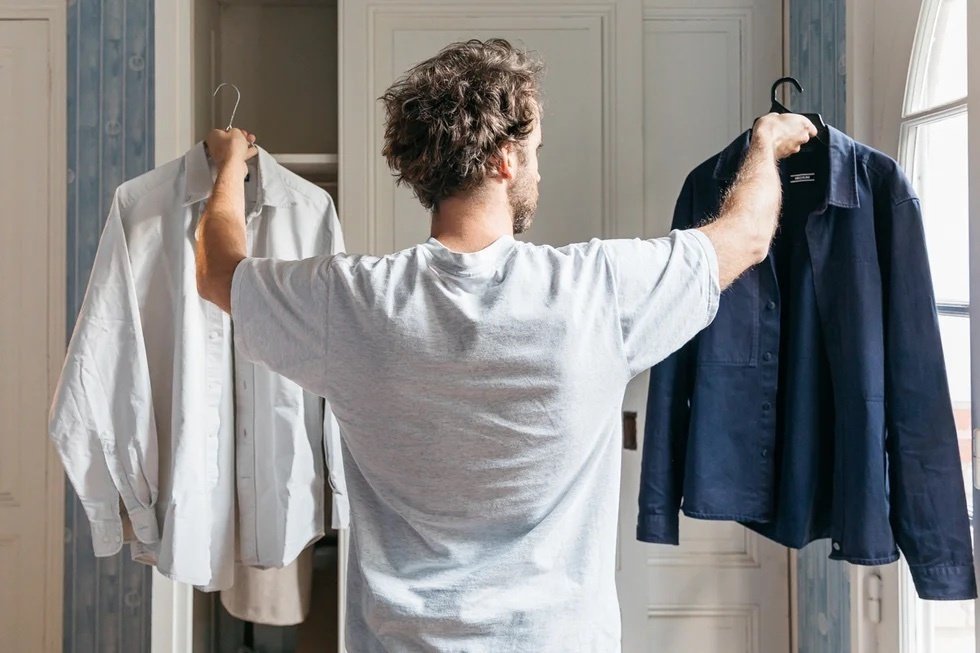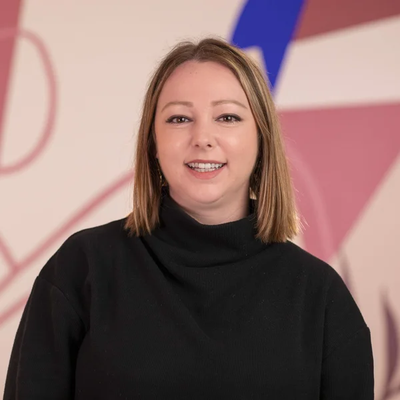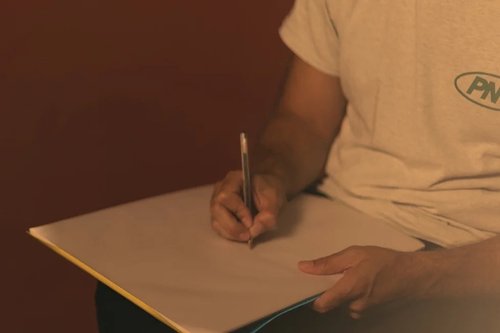Suited and booted: how to dress for an interview
Mar 21, 2023
7 mins


US Editor at Welcome to the Jungle
First impressions matter—a lot. A 2000 study by the University of Toledo showed that a recruiter determines the applicant’s skill, knowledge, and ability as early as the initial hello. Princeton psychologists have theorized our judgments actually come within the first 1/10th of a second. The study finds the more time participants are given to form an impression when looking at their subject, the more confident they are with their initial opinions.
A 2009 study titled Personality Judgments Based on Physical Appearance found that factors ranging from static cues like physical grooming, style of dress, and hairstyle and dynamic cues like non-verbal behavior, facial expression, and posture play a significant role in how impressions are formed. Dynamic cues take practice to master, but we can quickly change our appearance. It’s crucial to know what static cues are appropriate for specific job interviews, as not all styles are treated equally depending on your industry, job title, and company culture.
So, we’re here to answer the question: what should I wear to a job interview? Let’s dive in.
Company culture matters
When determining how to dress for an interview, some recruiters agree that knowing the company culture is imperative for finding the perfect outfit. Adina Volle, an international HR recruiter for a humanitarian organization based in Boone, North Carolina, believes it’s the biggest deciding factor on what to wear. “You can no longer say that everyone should be suited up to an interview because some company cultures pride themselves in being more casual,” she says.
Farzana Ruzehaji, a recruiting professional with experience in tech, finance, hospitality, and law, notes, “The rule of thumb for any industry is to dress for the job that you want.” In other words, you should dress like everyone else who works in that industry or has the same job title. For example, Volle and Benita Chavez, a recruiter with experience in oil and gas, healthcare, and tech, both point out that startup culture is often perceived as less formal than a corporate environment. Even if you’re interviewing for something a little more traditional job title, you’ll need to judge the company from your research.
How do you find a company’s culture?
For this, Volle recommends researching the company beforehand to learn about their culture. “I would also look on LinkedIn to see any workplace pictures,” she adds. Chaves suggests looking through employees’ profiles to find pictures of work events. Radhika Bhatt, a Social Impact & Climate Career Coach with experience in environmental green jobs, advises job hunters to review the company’s LinkedIn presence, including reading their most recent posts. She also suggests checking out the company website: “Read the About page and the company’s blog if they have one.” Another option, she says, is Glassdoor, “It will give you a better picture of the company culture as well.”
Smiles aren’t enough for client-facing roles
Client-facing roles—jobs where you represent the company externally—will typically be more formal, or represent the company’s brand, says Chavez. Possible roles are in sales, hospitality, customer service, and real estate. But they can also be what we consider internal roles, such as marketing, business development, and account management. Mimicking what you notice during your research is a good start.
What to wear for client-facing interviews
Job roles that require any client face-to-face interaction will require you to “dress as best as you can while keeping it as neutral as possible,” explains Chavez. Blending in while looking stylish and put together in a way that represents the company’s image is essential. Ruzehaji agrees; having experience hiring investment bankers and corporate and front desk hospitality workers, she recommends her clients wear “suits, ties, button-ups, slacks, or dresses.” Unless business casual is present in the company’s DNA, these recruiters recommend dressing smart by wearing a polished suit.
Go ahead and suit up!
Have you ever bought an interview outfit and left the tags on so you could return it later? Well, you might need to do it again if you’re interviewing for more formal roles—if you don’t already have a suit. Formal roles include jobs in law, finance, healthcare, business, natural resource businesses, and C-suite roles, according to Chavez. Even if your job title isn’t traditionally formal, your company might be, so you need to dress accordingly. Ruzehaji explains, “Working in HR at a financial firm meant I had to dress up more than when I worked for a tech company, even if it was the same role.”
What to wear for formal interviews
Job titles are less important when deciding what to wear in traditional industries. For example, if you’re interviewing for an administrative position, but it’s at a law firm, our recruiters recommend dressing your best with slacks, a button-up and tie, or a dress/skirt, keeping it formal and neutral. Chavez also brings up another fashion faux pas for formal roles: “Visible tattoos are an absolute no for the interview. So just go ahead and cover them up. You can cross that bridge when you’re in the job already.” As much as the working world is evolving, some traditional standards just aren’t budging. For now, play it safe and cover those sleeves.
Channel your inner Zuckerberg, but don’t go too far
Looking the part doesn’t necessarily mean wearing a suit—casual is king with some companies. Startups can be very relaxed, regardless of industry or job title, wearing sneakers, jeans, and t-shirts, Volle adds. But the most infamous casual industry is tech—think Mark Zuckerberg’s infamous hoodie and jean outfit he wears daily.
What to wear for tech interviews
Ruzehaji and Chavez were both recruiters for Meta, so they still have some valuable insights into big tech. Ruzehaji recommends dressing for the role, “All software engineers (SWE) in the office wear sneakers, sweats, and t-shirts, and you see a lot of that in interviews, which is appropriate.” She explains that SWE interviews can take hours, so they tell the candidates to wear comfortable clothes. She adds, “We’re testing them on what they know, not their looks, so it truly didn’t impact interview feedback.”
Even Ruzehaji wore sweats to her HR job daily while working at Meta. However, she also adds that if you show up in business casual, this won’t negatively impact your interview experience. Ruzehaji also warns, “there are no hard rules for each industry.” She remarks that she saw “public relations, other marketing employees, and the legal team dressed up wearing heels and button-downs at Meta too.”
Business casual or casual Friday?
Business casual is a happy medium between the two extremes. Bhatt firmly believes in wearing business or business casual for every interview, regardless of role or company. “Even green tech startups would still be business casual,” she explains. The humanitarian or charitable sector, according to Volle, leans business casual too. For the creative industry, it’s less about business casual, and more about wearing your stylish casual Friday outfit, explains Ruzehaji.
What to wear for creative interviews
Creatives dress to impress, but not necessarily in a business way. “Creatives dress so nice,” says Ruzehaji, “Not in a corporate suit way, but very put together.” While staying up-to-date on current fashion trends, creatives dress as if “they could be invited out right away and fit in regardless of setting,” she points out. For Volle, in the humanitarian sector, you should “dress business casual with non-extravagant makeup.” But what is business casual exactly?
You might think of business casual as a list of don’ts: no shorts, no t-shirts, no jeans, or nothing too revealing. But the do’s can vary depending on style, preference, and gender presentation. Bhatt agrees and offers you to decide, “Everyone’s style is different and unique, and you should feel comfortable dressing, even in an interview.” She recommends finding ideas wherever you get your fashion inspiration: Instagram, Pinterest, TikTok, etc.
Chavez has an interesting observation about the healthcare industry: “You need to dress more masculine.” She recommends women wear pants rather than dresses for interviews in the healthcare industry. Bhatt also notes that in the environmental sector, if you’re working and interviewing in the field, then “consider what you know about the role and what physical activity you might be doing,” as it might not be business casual.
More fashion advice for job interviews
Still not sure what to wear for your interview? Take a look at these additional tips from HR professionals.
When in doubt, go with business casual
Volle recommends that even if their dress code seems casual. “It’s probably safer to dress up and look more professional rather than dressing down,” she shares. Ruzehaji agrees: “I always tell my candidates it’s better to overdress than underdress. You can always remove a layer, but you can never go back and add more.” For example, if you wear a suit jacket and tie but notice things are a bit more casual, remove one or the other for an appropriate look. Even in a relaxed environment, Bhatt recommends wearing business casual attire for the interview.
Comfortable and confident
Bhatt advocates putting together an outfit that makes you feel comfortable and confident. “You are allowed to present yourself in a way that reflects who you are, even if that means pushing the standard definition.” Your outfit, she adds, should “empower you to bring your best self to the interview so you can confidently showcase your skills!”
Virtual interviews are changing the scene
Are you an all-business-on-top, party-on-bottom type of zoomer? Well, virtual interviews are still in full swing in the post-pandemic world. Chavez recommends going neutral, “Wear a plain black shirt or sweater, nothing with bright colors.” She adds that you could wear gray, white, or beige, but nothing with loud patterns as they are distracting on screen.
Just ask!
Initial interviews can be short phone calls or virtual meetings. Ruzehaji typically asks the recruiter about the dress code. Chavez agrees and recommends asking the first recruiter what you should wear to your following interview. “The recruiter just wants to make the hire. They get rated based on their metrics, so it’s in their interest to help you succeed in the recruitment process.”
The future of interview fashion
Defining proper fashion can be super outdated, explains Bhatt, “It can also be a bit loaded with gender assumptions and how society thinks different genders should present themselves.” Make sure to still be true to who you are. And, if you really hate uncomfortable, formal attire, Ruzehaji says, “There are comfortable options out there now for everyone with all different fashion brands. I’m also seeing all industries become more understanding about dress codes, especially those with robust HR and DEI teams.”
Photo: Welcome to the Jungle
Follow Welcome to the Jungle on Facebook, LinkedIn, and Instagram, and subscribe to our newsletter to get our latest articles every day!

More inspiration: Prepare for a job interview

Hybrid work goals: How to nail the negotiation in your next job interview
Want a hybrid work setup? Learn how to research, negotiate, and showcase the benefits of flexibility during your next job interview.
Dec 19, 2024

The secret to interview success? That annoying colleague
Got a story about a difficult coworker? Good! That office drama might just be your ticket to acing your next interview.
Dec 16, 2024

Is flexibility the key to “having it all” as a parent?
Balancing a career and parenthood can be challenging, but with the right approach, it’s possible to achieve both.
Oct 08, 2024

Slacker vs. control freak: What’s your interview style?
We’ve all been there: whether you're overly anxious or effortlessly cool—what best describes you?
Sep 24, 2024

Overcoming neurotypical norms during the job hunt
Neurodiverse individuals bring valuable innovation and should be more included in the workplace. How can we embrace their unique talents?
Sep 23, 2024
The newsletter that does the job
Want to keep up with the latest articles? Twice a week you can receive stories, jobs, and tips in your inbox.

Looking for your next job?
Over 200,000 people have found a job with Welcome to the Jungle.
Explore jobs